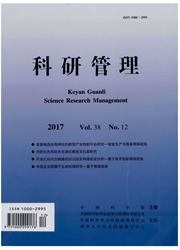

 中文摘要:
中文摘要:
为了分析新古典生产四要素之一的管理要素在中国经济增长中的作用和贡献,本文选择企业家知识溢出的视角,理论上通过把管理要素界定为一种知识性资源,论述管理要素的报酬递增性和累积性特征,在此基础上,结合企业家知识溢出方式,分析管理要素的作用过程,并论述了管理要素投入过程作为技术进步的一种实现机制,以及管理和资本、劳动三要素的产出弹性变动可能存在的规律性。实证分析中我们把企业家类型和禀赋引入人均生产函数,利用我国省级面板数据分析我国中小企业家数和大企业家数在人均生产量中的贡献,结果表明中小企业的人均贡献为38.5%低于大企业的人均贡献61.5%,与中小企业在总量贡献60%大于大企业贡献40%的结果不一致。原因在于中小企业家能力低于大企业家能力而导致中小企业经营管理效率低于大企业,由此建议政府要力促中小企业主向企业家的实质性转变,切实提高中小企业家的知识积累能力。
 英文摘要:
英文摘要:
Being one of new classical four production factors, the management factor has the important impact on economic growth. In order to study the effects of management factor, the process of entrepreneurial knowledge spillover is selected as the angle of view of study. Theoretically, by defining the management factor as one of knowledge resource, the increasing - returns and accumulation characters of the management factor are described. Combining with the spiUover mode of entrepreneur knowledge, the process that the management factor takes effect is discussed. The fact that management factor input is used as one of implementation mechanism bring about technical progress is elaborated, output elastic change involving three factors of management, capital, and labor might exist the regularity. Among the technical progress, the production contribution of management factom would be in direct proportion with the labor factors while it is in inverse proportion with the capital factor. In empirical analysis, the variable of type and endowment of entrepreneur is introduced into the production function of per capita, And by using provincial panel data in China, the contribution of the number of SME' s entrepreneur and big firm' s entrepreneur to per capita industrial production is studied. The result indicates that the SME' s per capita contribution to growth of per capita industrial production is 38.5 percent, and the big firms' contribution is 61.5 percent, while the SME' s contribution to gross industrial produetion is 60 percent, and the big firms' contribution is 40 percent. The SME' s per capita contribution is inferior to the big firms, the reason for the fact is that the management efficiency of SME is inferior to that of the big firms, such inference might result from that per capita profit is used to substitute for the entrepreneur ability.
 同期刊论文项目
同期刊论文项目
 同项目期刊论文
同项目期刊论文
 期刊信息
期刊信息
